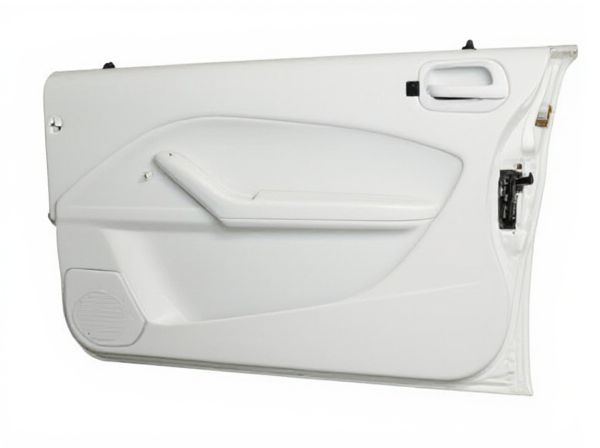
Photo illustration: Soft-close vs Standard Latch Door
Soft-close doors feature a mechanism that gently slows and closes the door, preventing slamming and reducing noise and wear. Standard latch doors rely on a simple catch to hold the door shut, offering a straightforward and cost-effective solution. Choosing a soft-close latch enhances your home's comfort and longevity by minimizing impact and providing a smooth closing experience.
Table of Comparison
| Feature | Soft-Close Door | Standard Latch Door |
|---|---|---|
| Mechanism | Hydraulic or electronic damping | Mechanical latch and spring |
| Closing Action | Automatic slow and silent closure | Manual, quick and sometimes noisy |
| Comfort | Enhanced convenience and luxury feel | Basic functionality |
| Safety | Reduces risk of door slamming injuries | Potential for finger pinching |
| Durability | Less wear on latch and frame | More mechanical wear over time |
| Cost | Higher initial cost | Lower initial cost |
| Maintenance | Occasional hydraulic or electronic check | Simple mechanical maintenance |
Introduction to Door Mechanisms
Soft-close door mechanisms reduce noise and wear by using hydraulic or pneumatic dampers to gently close the door, preventing slamming. Standard latch doors rely on mechanical latches that secure the door in place but allow it to close abruptly, often causing noise and potential damage over time. Understanding these mechanisms highlights the balance between functionality and durability in door design.
What is a Soft-Close Door?
A soft-close door features a hydraulic or pneumatic mechanism that gently slows the door as it closes, preventing slamming and reducing wear on the door frame and hinges. This system enhances noise reduction and provides a smoother, more controlled closing experience compared to standard latch doors, which rely on simple mechanical catches without cushioning. Soft-close technology is commonly used in kitchen cabinets, bathroom vanities, and furniture to improve durability and user comfort.
What is a Standard Latch Door?
A Standard Latch Door uses a basic mechanical catch that holds the door closed without any cushioning mechanism, allowing it to close with an audible click. This type of latch relies on a spring-loaded bolt or hook engaging a strike plate to secure the door, but it offers no dampening effect to prevent slamming. Standard latch doors are commonly found in residential and commercial settings where cost-effective and straightforward door hardware is preferred over enhanced noise reduction and door longevity.
How Soft-Close Doors Work
Soft-close doors use hydraulic or pneumatic dampers integrated into the hinge or latch mechanism to slow the door's movement and prevent slamming. These dampers absorb kinetic energy as the door closes, gently pulling it shut with minimal noise and wear. Unlike standard latch doors that rely on mechanical latches alone, soft-close systems enhance durability and safety by controlling the door's final motion.
How Standard Latch Doors Function
Standard latch doors operate with a mechanical catch that secures the door when closed, requiring a firm push or pull to engage or release. The latch bolt extends into the strike plate on the door frame, holding the door shut without cushioning or slow movement controls. This system offers straightforward functionality but lacks the gentle closing and noise reduction features found in soft-close doors.
Key Differences: Soft-Close vs Standard Latch
Soft-close doors use hydraulic dampers to ensure a quiet, controlled closing motion, preventing slamming and reducing wear on door components. Standard latch doors rely on mechanical latches that often cause noise and abrupt stops when closing, increasing the risk of damage over time. The soft-close mechanism enhances durability and user experience by minimizing impact, while standard latches prioritize simplicity and cost-effectiveness.
Advantages of Soft-Close Doors
Soft-close doors offer enhanced convenience by preventing slamming, reducing noise, and minimizing wear on hinges and frames, which prolongs door lifespan. Their hydraulic mechanism ensures smooth and controlled closing, improving safety by reducing finger injuries. Energy efficiency improves as soft-close doors close more securely, helping maintain consistent indoor temperature.
Benefits of Standard Latch Doors
Standard latch doors offer a reliable and straightforward mechanism that ensures secure closure without the complexity of additional hardware. They provide cost-effective durability, making them ideal for high-traffic areas where frequent use demands consistent performance. Maintenance and repairs are simpler with standard latch doors due to fewer moving parts, reducing long-term costs and downtime.
Choosing the Right Door System for Your Space
Soft-close door systems prevent slamming by using hydraulic or pneumatic mechanisms that gently close the door, enhancing durability and reducing noise in residential or commercial spaces. Standard latch doors rely on mechanical catches that secure the door when closed but may produce abrupt, louder impacts and require more maintenance over time. Selecting the right door system depends on factors such as desired noise reduction, frequency of use, space function, and budget considerations to ensure optimal performance and longevity.
Final Thoughts: Which Is Best for You?
Soft-close doors provide a quieter, more durable solution by preventing slamming and reducing wear on hinges, making them ideal for high-traffic areas and homes with children. Standard latch doors offer a more affordable, traditional option, suitable for budget-conscious projects or spaces where noise reduction is less critical. Choosing between soft-close and standard latch depends on priorities like noise control, longevity, and budget.
 caratoz.com
caratoz.com